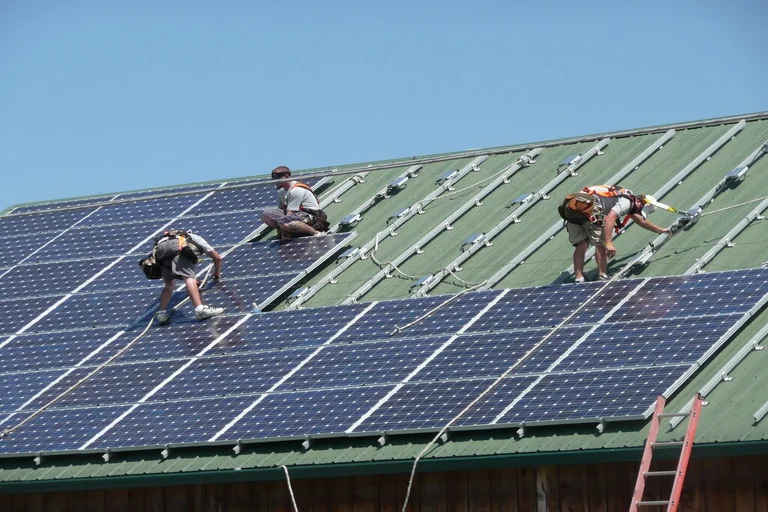
US Moves to Cancel $7 Billion in Grants for Solar Energy
According to reports, The U.S. Environmental Protection Agency (EPA) is thinking of ending $7 billion in subsidies under the Solar for All programs, a historic plan to provide access to solar energy for low- and moderate-income households that was financed by the Inflation Reduction Act (IRA).
Environmental organizations, state agencies, and legal experts have strongly criticized this Trump administration led action, claiming that taking these subsidies away will hurt disadvantaged areas, impede the advancement of sustainable energy, and perhaps violate federal law.
Background: The $7B Solar for All Program:
The Greenhouse Gas Reduction Fund created the “Solar for All” initiative, which goal to provide $7 billion in grants to states, tribes, municipalities, and nonprofit organizations so they can install rooftop and community solar systems in disadvantaged areas.
Key aspects of the program include:
- Targeting low-income households: Through solar acceptance, the program aimed to help 900,000 people in lowering their yearly electricity costs by an estimated $400.
- Job creation and emissions cuts: According to EPA estimates, the scheme would cut 30 million metric tons of CO₂ emissions, which is the same as removing 7 million cars from the road, and generate hundreds of thousands of jobs.
In order to provide distributed solar (and storage) to underserved and low-income communities across the US, it provided 60 grants to states, territories, tribes, municipalities, and nonprofit organizations using $7 billion from the IRA’s Greenhouse Gas Reduction Fund.
Additionally, an estimated 200,000 clean-energy jobs were expected to be created by the program in all 50 states and U.S. territories.
A key component of the Biden administration’s climate strategy, the program was designed to reduce financial inequality and accelerate the switch to renewable energy.
Why Is the Program at Risk?
According to Reuters and The New York Times, the EPA under the Trump administration plans to discontinue the program in August 2025. Although the agency has not yet reached a final drive, authorities claim that a new statute known as the “One Big Beautiful Bill Act” (OBBBA) may require the money to be refunded. According to Reuters and The New York Times, the EPA under the Trump administration plans to discontinue the program in August 2025. Although the agency has not yet reached a final drive, authorities claim that a new statute known as the “One Big Beautiful Bill Act” (OBBBA) may require the money to be refunded.
Established in 2025, this law contains measures that redirect or cancel funding from the Inflation Reduction Act, which initially granted the $7 billion. According to the EPA, it is examining whether the new law allows it to continue the program.
Who Will Be Affected?
Thousands of solar projects might be cancelled before they even begin if the cancellation is approved. This comprises:
- Families in rural and urban regions with low incomes.
- Tribal communities are working to lower pollution and energy expenses.
- Community solar projects are being built by local governments and nonprofits.
- Solar companies are prepared to recruit and train people for installation tasks.
For example:
- $249 million was given to Harris County in Texas to install solar and battery storage in disadvantaged areas.
- More than $60 million was allocated in Alaska to increase solar access in isolated villages.
- Tribes in the Dakotas, Arizona, and New Mexico were getting ready to start their own solar efforts.
How Does Clean Energy Get Affected by This?
The program was considered as one of the biggest investments ever made to provide renewable energy to low-income families. Additionally, it played a big role in President Biden’s strategy to reduce U.S. emissions in 2030
What Takes Place Next?
The EPA claims that it is currently looking into the matter and has not officially canceled the funding. But according to reports, the agency might stop the projects by sending letters to grant beneficiaries in a few days.
Communities, employees, and advocates of clean energy are now in a state of uncertainty as they await the outcome of their solar hopes.
The cancellation of the $7 billion in Solar for All funding may reverse America’s whole clean energy conversion and not just harm a few communities. Initiatives like these demonstrate how solving climate change can also result in better lives, more jobs, and cheaper costs—especially for those who need it most.
Read More Article>https://www.climatechallange.com/solar-wind-groups-look-for-aid-after-trumps-subsidy-cuts/